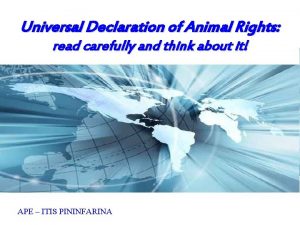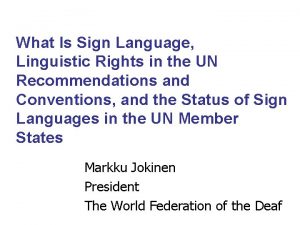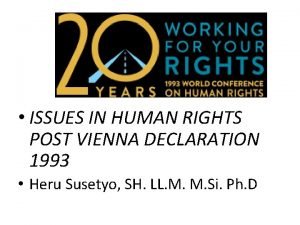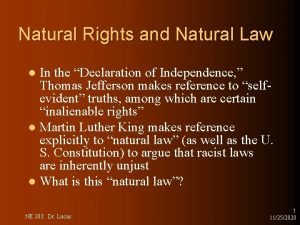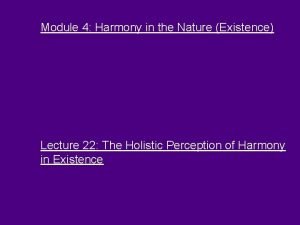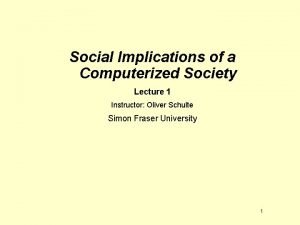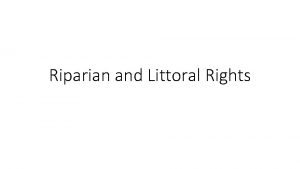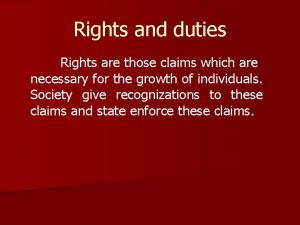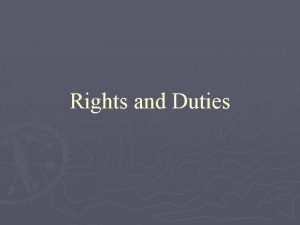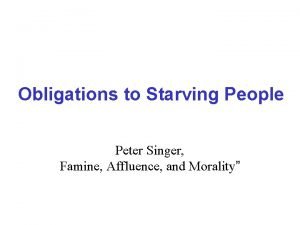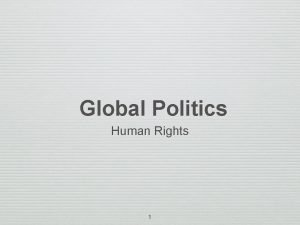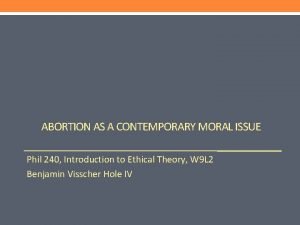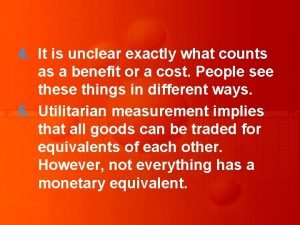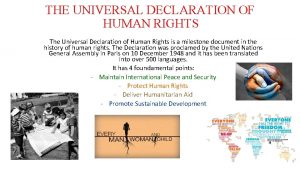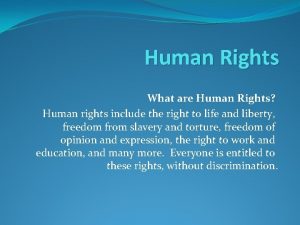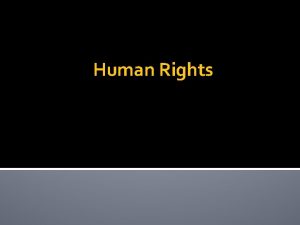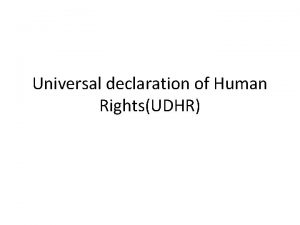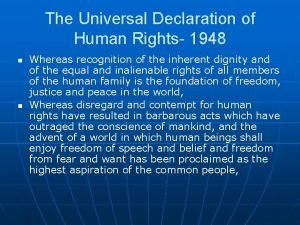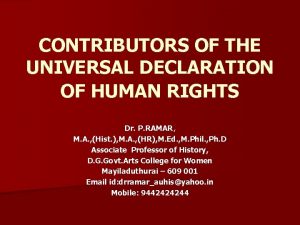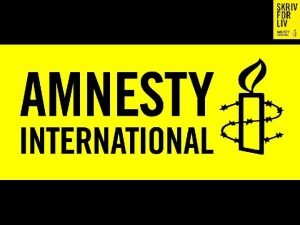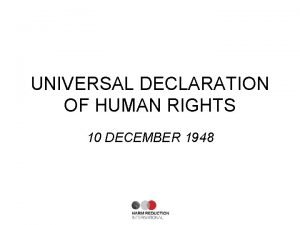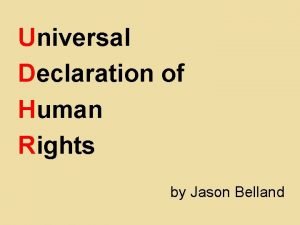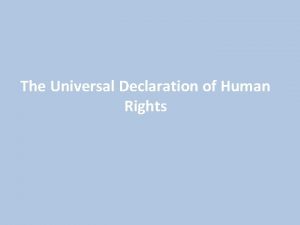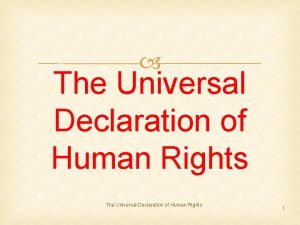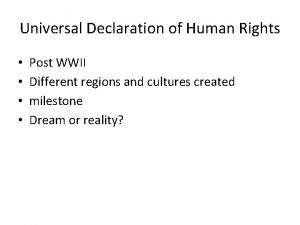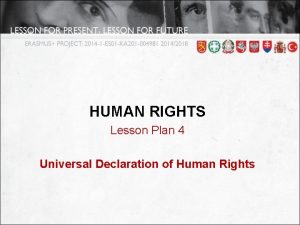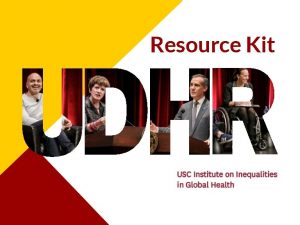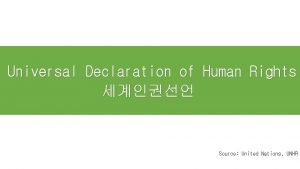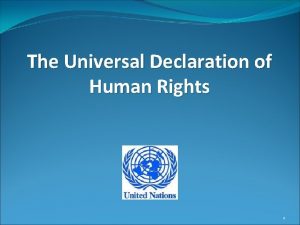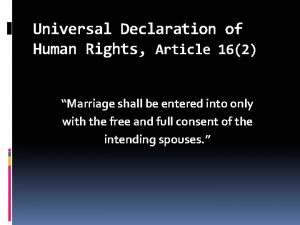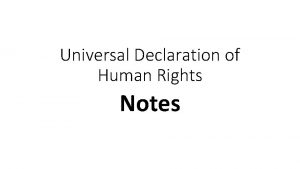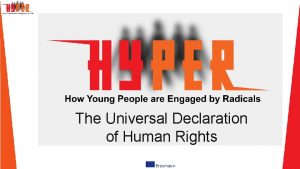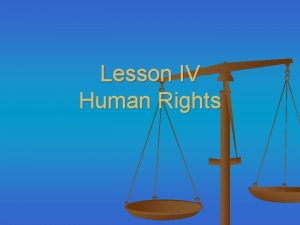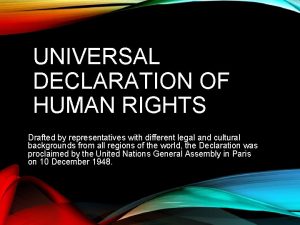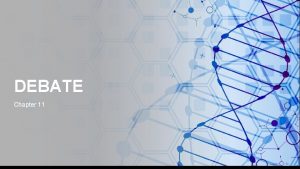Rights in the Universal Declaration of Human Rights






































- Slides: 38

Rights in the Universal Declaration of Human Rights

Civil and political rights v. social and economic rights

International Covenant on Civil and Political Rights (ICCPR) and the International Covenant on Economic, Social and Cultural Rights (ICESCR) 1966

Thailand made accession to the covenants in 1996 and 1999

Global rights: environment development peace

I. Civil and political Rights

Article 3. Everyone has the right to life, liberty and security of person.

Article 4. No one shall be held in slavery or servitude; slavery and the slave trade shall be prohibited in all their forms.

Article 5. No one shall be subjected to torture or to cruel, inhuman or degrading treatment or punishment.

6. Everyone has the right to recognition everywhere as a person before the law.

Article 7. All are equal before the law and are entitled without any discrimination to equal protection of the law.

Article 8. Everyone has the right to an effective remedy by the competent national tribunals for acts violating the fundamental rights.

Article 10. Everyone is entitled to a fair and public hearing by an independent and impartial tribunal, in the determination of his rights and obligations.

Article 9. No one shall be subjected to arbitrary arrest, detention or exile.

Article 11. 1 Everyone charged with a penal offence has the right to be presumed innocent

Article 11. 2 No one shall be held guilty of any penal offence on account of any act or omission which did not constitute a penal offence at the time when it was committed.

Article 12. No one shall be subjected to arbitrary interference with his privacy, family, home or correspondence, nor to attacks upon his honour and reputation.

Article 13. Everyone has the right to freedom of movement and residence

Article 14. Everyone has the right to seek and to enjoy in other countries asylum from persecution.

Article 15. Everyone has the right to a nationality.

Article 16 The family is the natural and fundamental group unit of society and is entitled to protection by society and the State.

Article 17. Everyone has the right to own property alone as well as in association with others.

Article 18 Everyone has the right to freedom of thought, conscience and religion

Article 19. Everyone has the right to freedom of opinion and expression

Article 20. Everyone has the right to freedom of peaceful assembly and association

Article 21. The will of the people shall be the basis of the authority of government; this will shall be expressed in periodic and genuine elections

II. Social, Economic and Cultural Rights

Article 22. Everyone, as a member of society, has the right to social security

Article 23. Everyone has the right to work, to free choice of employment, to just and favourable conditions of work and to protection against unemployment.

Article 24 Everyone has the right to rest and leisure, including reasonable limitation of working hours.

Article 25. Everyone has the right to a standard of living adequate for the health and well -being of himself and of his family

Article 26. Everyone has the right to education

Article 27. Everyone has the right freely to participate in the cultural life of the community

Article 29. Everyone has duties to the community.

Conflict of rights

Limits of rights

everyone shall be subject only to such limitations as are determined by law solely for the purpose of securing due recognition and respect for the rights and freedoms of others and of meeting the just requirements of morality, public order and the general welfare in a democratic society

Human rights do not represent a harmonious system. It is a collection of competing claims.
 Universal declaration of animal rights
Universal declaration of animal rights Universal declaration of linguistic rights
Universal declaration of linguistic rights Vienna declaration of human rights
Vienna declaration of human rights Florida declaration of rights
Florida declaration of rights Natural rights
Natural rights Universal ingredients of human communication
Universal ingredients of human communication Holistic perception of harmony
Holistic perception of harmony Positive vs negative rights
Positive vs negative rights Littoral right
Littoral right Characteristics of rights
Characteristics of rights Legal rights vs moral rights
Legal rights vs moral rights Negative rights
Negative rights Positive vs negative rights
Positive vs negative rights Positive vs negative rights
Positive vs negative rights Positive rights and negative rights
Positive rights and negative rights Hình ảnh bộ gõ cơ thể búng tay
Hình ảnh bộ gõ cơ thể búng tay Lp html
Lp html Bổ thể
Bổ thể Tỉ lệ cơ thể trẻ em
Tỉ lệ cơ thể trẻ em Gấu đi như thế nào
Gấu đi như thế nào Tư thế worm breton là gì
Tư thế worm breton là gì Bài hát chúa yêu trần thế alleluia
Bài hát chúa yêu trần thế alleluia Môn thể thao bắt đầu bằng chữ f
Môn thể thao bắt đầu bằng chữ f Thế nào là hệ số cao nhất
Thế nào là hệ số cao nhất Các châu lục và đại dương trên thế giới
Các châu lục và đại dương trên thế giới Công của trọng lực
Công của trọng lực Trời xanh đây là của chúng ta thể thơ
Trời xanh đây là của chúng ta thể thơ Mật thư tọa độ 5x5
Mật thư tọa độ 5x5 Phép trừ bù
Phép trừ bù độ dài liên kết
độ dài liên kết Các châu lục và đại dương trên thế giới
Các châu lục và đại dương trên thế giới Thơ thất ngôn tứ tuyệt đường luật
Thơ thất ngôn tứ tuyệt đường luật Quá trình desamine hóa có thể tạo ra
Quá trình desamine hóa có thể tạo ra Một số thể thơ truyền thống
Một số thể thơ truyền thống Cái miệng bé xinh thế chỉ nói điều hay thôi
Cái miệng bé xinh thế chỉ nói điều hay thôi Vẽ hình chiếu vuông góc của vật thể sau
Vẽ hình chiếu vuông góc của vật thể sau Thế nào là sự mỏi cơ
Thế nào là sự mỏi cơ đặc điểm cơ thể của người tối cổ
đặc điểm cơ thể của người tối cổ Thế nào là giọng cùng tên? *
Thế nào là giọng cùng tên? *
